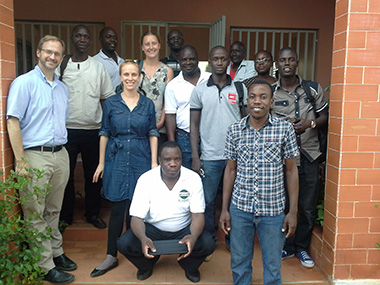The following post, written by Kate Ambler, Alan de Brauw, Susan Godlonton, and Anna Vanderkooy from IFPRI’s Markets, Trade, and Institutions Division, is the first in a series of researcher-authored blog stories highlighting ongoing applied microeconomics research at IFPRI.
Learning through randomized control trials can be an ongoing process, and it does not stop at the conclusion of the study. In October, partners on the “Adapting and Implementing Fomento in Africa” project met in Dakar to share approaches, results, and knowledge from the first year of the project.
In Brazil, Fomento combines extension services with cash transfers over a two year period. The extension services create individualized strategies to help farmers improve their household agricultural productivity and to better link households to markets. The cash transfers, in turn, are contingent on implementing these strategies and can help households catalyze investments suggested by the extensionist. The Markets, Trade and Institutions Division’s “Adapting and Implementing Fomento in Africa” project experiments with understanding the impacts of core Fomento elements while specifically tailoring them to local conditions in Malawi and Senegal.
Midway through the project, we provided the opportunity for project partners to meet and learn from each other both across countries (between Senegal and Malawi) and across disciplines (between researchers and implementers). Representatives of IFPRI, FONGS (the primary implementing partner in Senegal), NASFAM (the primary partner in Malawi), and supporting partners GRET and IPA came together for a three-day workshop in Dakar to stimulate cross-project learning.
FONGS, which grew from a movement of farmers’ associations in Senegal, has been developing a farmer-based approach to advisory services and tools over the long term, not just as part of the Fomento project. Their tools aim to increase discussion among farm household members and to provide information and technical support specific to each household’s individualized situation. In collaboration with GRET and IFPRI, FONGS has refined two annual advisory tools over the course of the project. The first tool serves as an information source about and for each household, while the second tool, the farm management plan, is used by the association facilitator to guide households in their agricultural planning for the upcoming year.
Workshop participants had an opportunity to witness FONGS’ activities in the field and to learn more about FONGS’ work implementing microfinance, rural banking, improved crop storage, and biogas generation. Workshop attendees from NASFAM praised FONGS’ household- and village-level approaches, which allow farmers to avoid high interest rates and post-harvest losses while saving money by producing value-added products and biogas.
Partners from NASFAM, the largest independent, smallholder-owned organization in Malawi, shared their work in seed bank development and conservation agriculture. NASFAM has used its experience in these sectors over the first year of the project by conducting demonstrations on planting techniques to increase yields, business plan development with households, and seed bank use by project participants. FONGS and GRET were particularly interested to hear about NASFAM’s farmer trainers, who receive extensive technical training on the principles of extension, crop production practices, demonstration plots, natural resources management, and farm businesses (as opposed to FONGS’ facilitators who are farmers themselves, with varied levels of technical training).
Implementation partners compared lessons learned and difficulties experienced in the first year of the project. NASFAM has found that the project has improved member engagement, service delivery, job creation, production, and access to affordable seed and is contributing to the creation of a robust market for both seed and grain. Both partners expressed that the randomized component of the project has been a new challenge, as project participants receive different treatments and project staff need to carefully apply and monitor each aspect of the project; however, they pointed out that the challenge is not insurmountable. FONGS has found that the effectiveness of the agricultural advisory services depends highly on the farm household’s ability to adapt its activities and on the experience and methods used by each individual facilitator to support the households. Both partners shared that farmers in their countries do not tend to keep formal records of their activities, and that the project’s emphasis on the use of advisory and business tools contributes positively to farm management.
The workshop solidified plans to share research results more widely across partners. FONGS plans to use project results to contribute to the development of effective services for their farmer members, including the continued adaptation and dissemination of their advisory tools to other organizations with whom they work in both Senegal and other West African countries. NASFAM is planning to share project results with the Malawi government, farmer groups, and members.
Moreover, cross-country learning opportunities were found valuable by all participants. NASFAM was impressed by FONGS farmers’ use of simple techniques to add value to agricultural products at or very close to the farmer level, as well as their use of traditional pest control systems to reduce post-harvest losses. On a more philosophical note, workshop participant Mar Ngom (FONGS) perhaps put it best in closing: “Farmer-to-farmer and organization-to-organization discussions and exchange are a powerful lever in capacity building”. IFPRI looks forward to continuing these discussions and exchanges with its partners as a way to build capacity and strengthen collaborative research that leads to research-based policy solutions.







